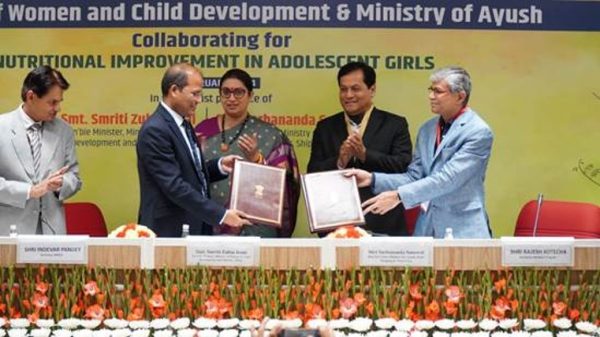
Ayurveda Interventions To Help Improve Nutrition Intake In Adolescent Girls
Adolescent girls are at increased risk of nutrient deficiencies due to their elevated nutritional needs during growth spurts, as well as factors like menstruation, which can lead to iron deficiency anemia if not properly addressed. Ensuring they receive adequate nutrients can prevent deficiencies that may have long-term consequences on their health. Improving nutrition in girls also helps in their growth, cognitive development, immune function, reproductive and bone health, improves mental health and overall well-being. Govt. of India recently has taken additional steps to improve adolescent girls’ nutritional quality via Ayurvedic method – Healthy Life.
Ministry of Ayush and Ministry of Women and Child Development have signed a MoU for the nutritional improvement in adolescent girls through Ayurveda Interventions. It is a Joint Public Health Initiative for “Anaemia Control among adolescent girls using Ayurveda interventions in the five districts under Mission Utkarsh”, today at Vigyan Bhavan, New Delhi. The MoU was signed in the presence of Union Minister of Ayush Shri Sarbananda Sonowal and Union Minister of Women and Child Development Smt. Smriti Irani.
Both the Ministries have jointly decided that in the first phase, the focus may be given to improve the anaemic status of adolescent girls (14-18 years) in five aspirational districts of five states namely Assam–Dhubri; Chhattisgarh- Bastar; Jharkhand – Paschimi Singhbhum; Maharashtra – Gadchiroli; Rajasthan – Dhaulpur.
The Ministry of Ayush and Ministry of Women and Child Development have entered into this Memorandum of Understanding (MoU) with the aim of nutritional improvement of approximately 95,000 adolescent girls in the Anaemia prone districts (where average prevalence of anaemia is approximately 69.5 %) today. This project will cover approximately 10,000 Anganwadi Centres in the five districts.
Addressing the gathering, Shri Sarbananda Sonowal stated that both the Ministries are collaborating to make India free of anaemia. To achieve the goal of ‘Anaemia Mukt Bharat’ (Anaemia Free India) MoU has been signed between both Ministries.
Shri Sarbananda Sonowal reiterated, that the Mission Utkarsh launched by our Prime Minister of India with a goal to reach the national average of the Key Performance Indicators (KPIs) in these aspirational districts.
On this occasion, Smt. Smriti Irani emphasized that introducing Ayush systems, backed by evidence from institutions like ICMR, will offer cost-effective solutions to tackle anemia, hitherto unknown to the world. She said that along with cost effectiveness, introducing 95,000 beneficiaries and time bound outcome, will provide opportunities for medical communities globally to study and reflect upon, whereby making it an initiative of global importance.
Secretary, Ministry of Ayush Vaidya Rajesh Kotecha said, “Anemia in adolescence causes reduced physical and mental capacity and diminished concentration in work and educational performance. It also poses a major threat to future safe motherhood in girls. He said that the traditional systems of medicine in India are the integral part of the health care in the primary health settings.
Secretary, Ministry of Women and Child Development Shri Indewar Pandey said that one of the primary objectives of the Women and Child Development Ministry is to address the challenge of malnutrition in children, adolescent girls and pregnant women for which we run “Saksham Aanganbaadi” and “Poshan” Scheme. He informed that the scheme is being dealt with the support of 13.97 lacs Aanganbaadis across the country. Focusing the girls between 14 to 18 years of age group is important because when they get married after 18 years they can give birth to healthy children in future. With Ayush we have done more 2.7 crore Ayush based activities with “Poshan Maah” and “Poshan Pakhwada”.
The Central Council for Research in Ayurvedic Sciences (CCRAS) has good level of experience in this field. Besides conducting clinical trials, the public health initiatives like, National campaign on Anaemia control through Ayurveda conducted at 323 health centres in 13 states of the country and; a multi-level operational study at PHCs in the Gadchiroli District regarding effectiveness of Ayurvedic Interventions for Ante-Natal care (Garbhini Paricharya) with change in haemoglobin level as an outcome are already implemented successfully by CCRAS.
During the event Prof. Ravi Narayan Acharya, Director General – Central Council for Research in Ayurveda Science (CCRAS), Pushpa Chaudhary, Team Lead Reproductive, Maternal, Child and Adolescent health WHO. Dr Rajeev Bahl, DG ICMR, other dignitaries were also present.
Further read; https://pib.gov.in/PressReleasePage.aspx?PRID=2009186
Author: HealthyLife | Posted on: April 3, 2024
« Sustainable Energy Initiatives In India And The World Understanding Biofortified Seeds »






















Write a comment